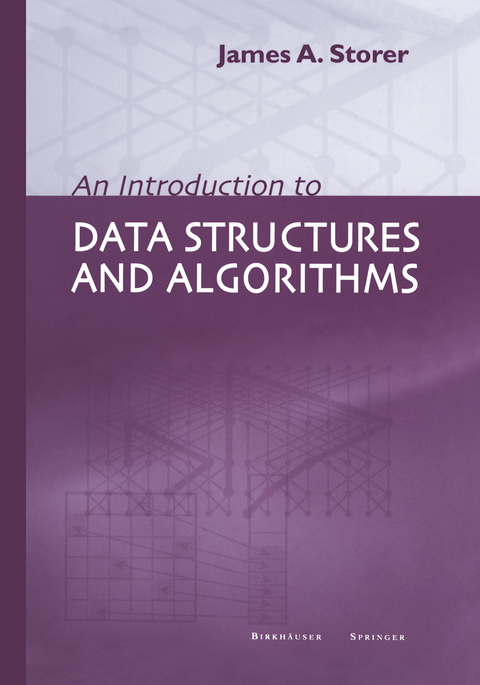
An Introduction to Data Structures and Algorithms
Seiten
2012
|
Softcover reprint of the original 1st ed. 2002
Springer-Verlag New York Inc.
978-1-4612-6601-3 (ISBN)
Springer-Verlag New York Inc.
978-1-4612-6601-3 (ISBN)
* Sorting, often perceived as rather technical, is not treated as a separate chapter, but is used in many examples (including bubble sort, merge sort, tree sort, heap sort, quick sort, and several parallel algorithms).
Data structures and algorithms are presented at the college level
in a highly accessible format that presents material with one-page
displays in a way that will appeal to both teachers and students. The
thirteen chapters cover: Models of Computation, Lists, Induction and
Recursion, Trees, Algorithm Design, Hashing, Heaps, Balanced Trees,
Sets Over a Small Universe, Graphs, Strings, Discrete Fourier
Transform, Parallel Computation.
Key features: Complicated concepts are expressed clearly in a
single page with minimal notation and without the "clutter" of the
syntax of a particular programming language; algorithms are presented
with self-explanatory "pseudo-code." * Chapters 1-4 focus on
elementary concepts, the exposition unfolding at a slower pace. Sample
exercises with solutions are provided. Sections that may be skipped
for an introductory course are starred. Requires only some basic
mathematics background and some computer programming experience. *
Chapters 5-13 progress at a faster pace. The material is suitable for
undergraduates or first-year graduates who need only review Chapters 1
-4. * This book may be used for a one-semester introductory course
(based on Chapters 1-4 and portions of the chapters on algorithm
design, hashing, and graph algorithms) and for a one-semester advanced
course that starts at Chapter 5. A year-long course may be based on
the entire book. * Sorting, often perceived as rather technical, is
not treated as a separate chapter, but is used in many examples
(including bubble sort, merge sort, tree sort, heap sort, quick sort,
and several parallel algorithms). Also, lower bounds on sorting by
comparisons are included with the presentation of heaps in the context
of lower bounds for comparison-based structures. * Chapter 13 on
parallel models of computation is something of a mini-book itself, and
a good way to end a course. Although it is not clear what parallel
Data structures and algorithms are presented at the college level
in a highly accessible format that presents material with one-page
displays in a way that will appeal to both teachers and students. The
thirteen chapters cover: Models of Computation, Lists, Induction and
Recursion, Trees, Algorithm Design, Hashing, Heaps, Balanced Trees,
Sets Over a Small Universe, Graphs, Strings, Discrete Fourier
Transform, Parallel Computation.
Key features: Complicated concepts are expressed clearly in a
single page with minimal notation and without the "clutter" of the
syntax of a particular programming language; algorithms are presented
with self-explanatory "pseudo-code." * Chapters 1-4 focus on
elementary concepts, the exposition unfolding at a slower pace. Sample
exercises with solutions are provided. Sections that may be skipped
for an introductory course are starred. Requires only some basic
mathematics background and some computer programming experience. *
Chapters 5-13 progress at a faster pace. The material is suitable for
undergraduates or first-year graduates who need only review Chapters 1
-4. * This book may be used for a one-semester introductory course
(based on Chapters 1-4 and portions of the chapters on algorithm
design, hashing, and graph algorithms) and for a one-semester advanced
course that starts at Chapter 5. A year-long course may be based on
the entire book. * Sorting, often perceived as rather technical, is
not treated as a separate chapter, but is used in many examples
(including bubble sort, merge sort, tree sort, heap sort, quick sort,
and several parallel algorithms). Also, lower bounds on sorting by
comparisons are included with the presentation of heaps in the context
of lower bounds for comparison-based structures. * Chapter 13 on
parallel models of computation is something of a mini-book itself, and
a good way to end a course. Although it is not clear what parallel
1. RAM Model.- 2. Lists.- 3. Induction and Recursion.- 4. Trees.- 5. Algorithm Design.- 6. Hashing.- 7. Heaps.- 8. Balanced Trees.- 9. Sets Over a Small Universe.- 10. Graphs.- 11. Strings.- 12. Discrete Fourier Transform.- 13. Parallel Computation.- Appendix: Common Sums.- A. Approximating Sums with Integrals.- B. Arithmetic Sum.- I. Harmonic Sum.- J. Sums of Inverse Powers.- Notation.
| Mitarbeit |
Stellvertretende Herausgeber: John C. Cherniavsky |
|---|---|
| Zusatzinfo | XVII, 599 p. |
| Verlagsort | New York |
| Sprache | englisch |
| Maße | 178 x 254 mm |
| Themenwelt | Informatik ► Theorie / Studium ► Algorithmen |
| Informatik ► Theorie / Studium ► Kryptologie | |
| Mathematik / Informatik ► Mathematik ► Angewandte Mathematik | |
| ISBN-10 | 1-4612-6601-7 / 1461266017 |
| ISBN-13 | 978-1-4612-6601-3 / 9781461266013 |
| Zustand | Neuware |
| Haben Sie eine Frage zum Produkt? |
Mehr entdecken
aus dem Bereich
aus dem Bereich
IT zum Anfassen für alle von 9 bis 99 – vom Navi bis Social Media
Buch | Softcover (2021)
Springer (Verlag)
CHF 41,95
Interlingua zur Gewährleistung semantischer Interoperabilität in der …
Buch | Softcover (2023)
Springer Fachmedien (Verlag)
CHF 46,15
Buch | Softcover (2024)
Lehmanns Media (Verlag)
CHF 55,95


